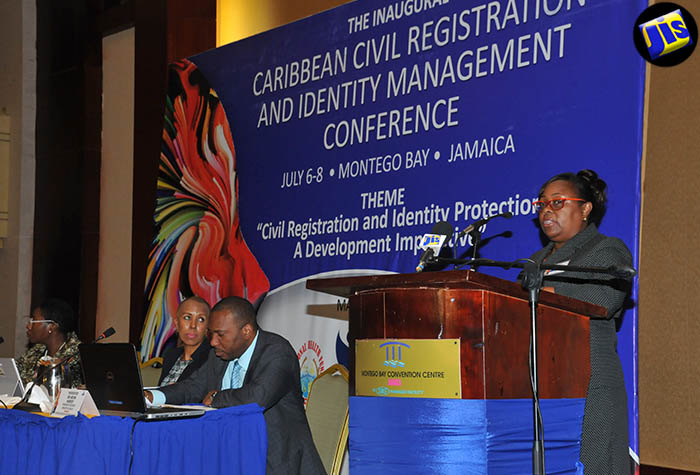CEO of RGD Recommends Change to Bedside Registration
By: , July 8, 2016The Key Point:
The Facts
- The CEO pointed out that this practice presents an issue for the child later in life, especially in instances of migration or the claiming of an estate.
- Some 21 Registrars from across the Caribbean are taking part in the meeting to discuss methods of improving the process of Civil Registration and Identity Management in the region.
The Full Story
Chief Executive Officer (CEO) of the Registrar General’s Department (RGD), Deirdre English Gosse, is recommending that the practice of bedside registration, where a mother is not required to show proof of identification before names are added to her child’s birth record, should be amended.
Addressing the inaugural Caribbean Civil Registration and Identity Management Conference at the Montego Bay Convention Centre in Rose Hall, St. James, on July 7, Mrs. English Gosse argued that the current practice has serious implications for a child’s future and needs to be reversed.
She said the RGD will continue to be proactive in pushing for legislation, especially since there could be legal and also criminal ramifications involving fathers who get underage girls pregnant.
“When a child is being registered during bedside registration in the hospital, the mother is only required to tell the Registration Officer her name, with no need for an official verification,” Mrs. English Gosse noted.
“In some instances, especially for teenage mothers who are reluctant to reveal the name of the child’s father, the Registration Officer is oftentimes given an alias name, and in some cases, someone else’s name,” she added.
The CEO pointed out that this practice presents an issue for the child later in life, especially in instances of migration or the claiming of an estate.
She noted that there have been numerous cases of mothers having to do maternity tests “to prove she is the mother”, as well as to file an application to the RGD for an amendment to the child’s birth certificate to correct whatever misleading or incorrect information was given during the registration process.
“This has to be done through a Correction of Error process,” Ms. English Gosse explained.
She pointed out that an amendment to the practice will not only protect the credibility of the vital information collected at registration, but will also safeguard against common errors in a mother’s name on a birth certificate.
Common errors, the RGD Head said, include the unintentional use of an alias or ‘pet name’, spelling errors, and the middle name being stated as the first name. These errors, she said, can take “forever” before they are corrected.
Some 21 Registrars from across the Caribbean are taking part in the meeting to discuss methods of improving the process of Civil Registration and Identity Management in the region. The conference ends today (July 8).



